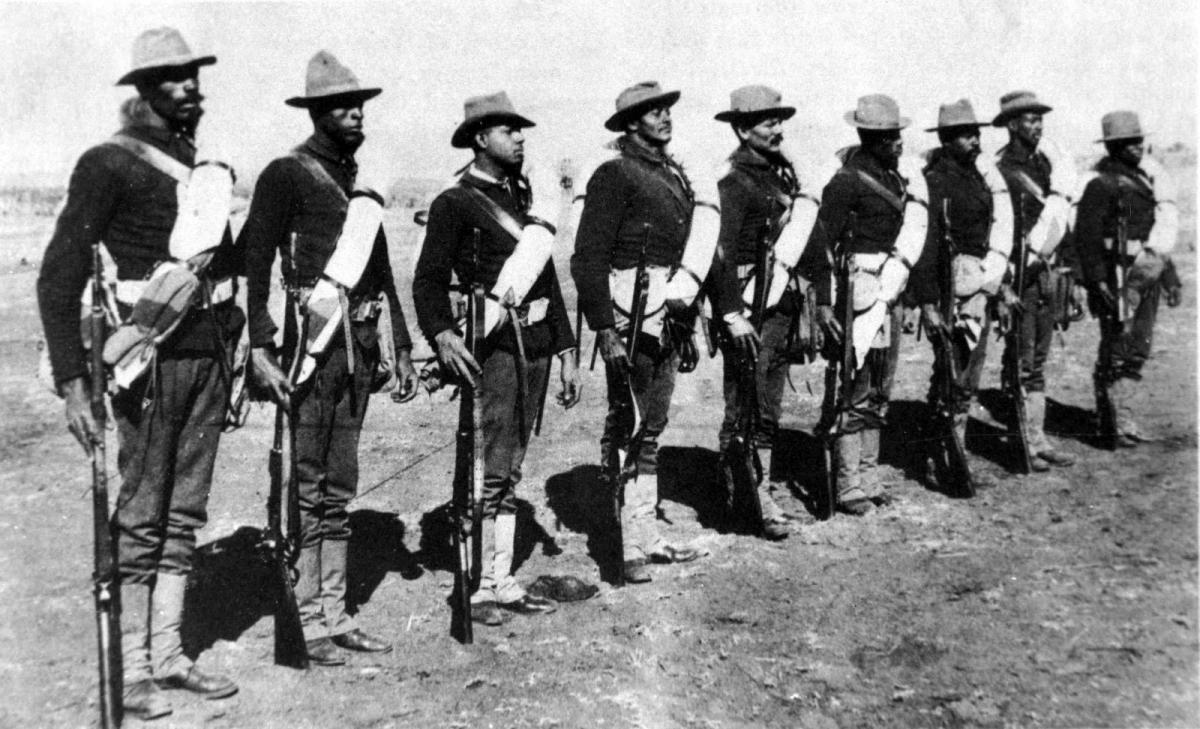The Missouri Valley Special Collections recently completed the processing of the Frank Schubert Buffalo Soldiers Collection, containing the research files, speeches and presentations, manuscripts and articles, and photographs compiled by historian Frank (Mickey) Schubert. The collection is a thorough compilation of scholarly research and writing on an important subject of African American and Western American History. Not only does it include substantial historical information about the topic of Buffalo Soldiers, it also is a great resource for finding original records of the Buffalo Soldiers in repositories scattered throughout the country.
Schubert's research of African-American history began while he was an undergraduate history student at the historically black Howard University. In addition to earning his M.A. at the University of Wyoming and Ph.D. at the University of Toledo, he spent decades researching, writing, and giving presentations and university lectures on Buffalo Soldiers. Beyond his many scholarly articles and university lectures, Schubert wrote numerous books including On the Trail of the Buffalo Soldier, Volumes 1 and 2; Black Valor; Voices of the Buffalo Soldier; and Buffalo Soldiers, Braves and the Brass.
Before the regiments known as "Buffalo Soldiers" came about, African-Americans had fought with the Continental Army during the Revolutionary War and served unofficially in subsequent wars, but the Militia Acts of 1792 officially banned them from the U.S. Army. After the Civil War began and started to take a toll, the desperate need for soldiers once again justified the inclusion of African-Americans. So in July 1862, Congress passed the Second Confiscation and Militia Act allowing the enlistment of black soldiers in the Union Army. Then, in January 1863, the Emancipation Proclamation freed slaves in the Confederate States and granted them paid service in the Union Army.
By the end of the war in 1865, about 180,000 African-Americans had served in the army and navy as volunteers. With the war over and the need for soldiers lessened, many of the volunteers were relieved of duty. However, the contributions of the black volunteers had been seen and felt, and in 1866, when Congress reorganized the army, it created the first black regular regiments in U.S. history.
The new segregated regiments included two infantry regiments (the 24th and 25th) and two cavalry regiments (the 9th and 10th), and were led by white officers. They were later nicknamed "Buffalo Soldiers," and it is important to note that – unlike some other scholars – Schubert narrows their historical ranks to black soldiers in the U.S. Army between the Civil War and World War I.
These four regiments, though only a small percentage of the frontier military, were central in the Army's involvement in expanding government control across the frontier while also serving in the Indian Wars, the Spanish-American War, the Philippine-American War, and the 1916 Mexican Punitive Expedition. Among them were 23 Buffalo Soldiers who received the Medal of Honor, five who became officers, and three who graduated from West Point.
Schubert's research and writing examine the variety of individuals who served as Buffalo Soldiers, as well as the confluence of history, myth, and memory surrounding them. He argues:
"The spread of the United States across the continent is one of the central acts of the American national drama, one of the processes that Americans consider defining, unquestionably a mainstream development, and these soldiers were participants. This is the most important message of the buffalo soldier: despite obstacles placed in the way of black progress, despite racism and discrimination, blacks participated in the frontier drama."
Schubert also notes in his work that examining the relationship between black soldiers and Indians throughout the 19th century is complex as each faced their own obstacles as they fought for survival. His writing challenges the glorification and idealization of the Buffalo Soldiers and frontier history and instead tells the history of both Medal of Honor winners and those discharged for nefarious behavior. Schubert focuses on the rare opportunity that military service offered to 19th century African-Americans.
The Frank Schubert Buffalo Soldier Collection contains copies of documents, photographs, and articles from Schubert's decades of research at various historical record repositories; much of his correspondence with other historians; copies of his many presentations and talks; and manuscripts of other contemporary historians. It is an excellent resource for anyone interested in America's frontier history, the wars in the Philippines and Cuba, the lives of the Buffalo Soldiers during and after their service, and how they have been commemorated and remembered since.

The finding aid for this collection is available online at www.kchistory.org. For more information about this collection, please contact the Missouri Valley Special Collections at 816-701-3427 or lhistory@kclibrary.org.
References:
Leckie, William and Shirley Leckie. The Buffalo Soldiers: A Narrative of the Black Cavalry in the West. Revised ed., Norman, Oklahoma: University of Oklahoma Press, 2003.
Schubert, Frank N. "Buffalo Soldiers: Myths and Realities." Frank Schubert Buffalo Soldiers Collection (SC197), Missouri Valley Special Collections, Kansas City Public Library, Kansas City, Missouri.
Schubert, Frank N. "The Buffalo Soldiers: A Little History and a Little Mythology." Frank Schubert Buffalo Soldiers Collection (SC197), Missouri Valley Special Collections, Kansas City Public Library, Kansas City, Missouri.
Schubert, Frank N. Voices of the Buffalo Soldier. Albuquerque, New Mexico: University of New Mexico Press, 2003.
